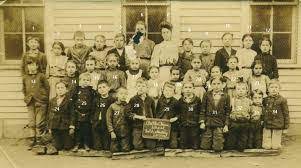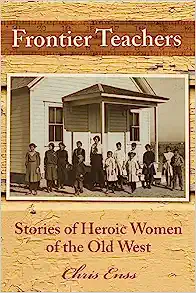Enter now to win a copy of
Frontier Teachers: Stories of Heroic Women in the Old West

A New England schoolmarm living in Wyoming in 1879, falls in love with a cowboy who’s not only an expert roper and rider, but handy with a gun. The teacher is opposed to violence, and her relationship with the cowboy is put to the test when he insists on squaring off with a card sharp who’s accused him of being a cattle thief and a liar. This is not a storyline in a Harlequin paperback series, but of a novel hailed by newspapers from the San Francisco Chronicle to the Kansas City Star as one of the “best romances of the West in American literature.” The novel is the Virginian: A Horseman on the Plains by Owen Wister.
Published in 1902 by Macmillan Company of New York, the hero of the story is a Virginian who drifted out on the old Santa Fe trail when he was sixteen, and who, at twenty-seven, when the story opens, is a master of the cowboy arts. Wister’s Virginian has a grand sense of humor. The Yankee schoolteacher is a fine woman, but I wish she’d been a little more jovial; then maybe her cowboy wouldn’t have had to endure so many forlorn days. Wister captures their fragile romance with lines like “she would watch him with eyes that were fuller of love than of understanding” and “Ah, me. If marriage were as simple as love!”
Now I admit I’ve never been a fan of romance novels. The stories of beautiful people and how their love blossoms in unusual circumstances seem implausible to me. When is anyone ever taking a casual ride on the prairie dressed in a taffeta gown complete with a black velvet and lace bonnet and silk gloves? And then, on that ride meet a shirtless, Chris Hemsworth type searching for a wandering calf? I went on a horseback ride with a guy once, we were both dressed in jeans and a T-shirt. It was kind of fun until he ran out of quarters. But I digress.
Many of the most celebrated books in the western genre are romances. From Dorothy Johnson’s short story, The Man Who Shot Liberty Valance and Louis L’Amour’s Conagher to Lauran Paine’s The Open Range Men and Max Evan’s The Hi-Lo Country, romance is a driving force in those westerns. Not only does the romantic element make the stories compelling, but, as it turns out, it’s also a key selling point.
A Publishers Weekly 2020 study showed that 72.6 million Americans read at least one romance a year. Thirty-two percent of those readers were men. Close to half of the romance books that sold were set on the American frontier. According to a 2021 study by Psychology Today, the common ingredient that explains the appeal of the western romance is the “dashingly handsome, rogue cowboy captivated by the female lead who ultimately reforms his ways.” The study also shows readers enjoy a romance story because it “simply gives them hope that they too could have that romantic love of which they dream.”
Whatever the reason, romance is big business, particularly in book publishing. Online magazine MarketWatch notes it’s a billion-dollar industry and western romances claim a respectable percentage of those earnings.
In addition to Owen Wister, contemporary western romance writers have authors James Fenimore Cooper, Bret Harte, and Zane Grey to thank for pioneering the genre. Since their work debuted in mercantile stores and bookshops across the country in the 1870s to the early 1900s, the field has undergone changes and evolved with the times. Western romance novels are no longer strictly written from the male perspective. The focus has shifted from the hero’s goals and wants to the heroine’s journey, motivations, and aspirations.
The fancy but picturesque character study in The Virginian is just one of the reasons it ranks as one of the best western romance novels. That, and Wister’s talent for writing crisp dialogue which makes it hard to resist rooting for his lead characters to live happily ever after. “I don’t think I like you,” the schoolmarm says to the Virginian. “That’s all square enough,” he replies. “You’re going to love me before we get through.”
That’s the goal for all western romance authors, that we love what they’ve written before we get through with their stories.


